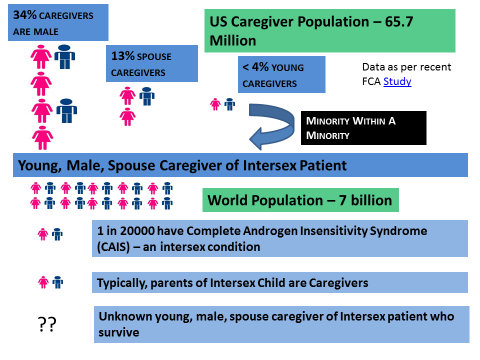Intersex or Androgen Insensitivity Syndrome is a traumatic genetic condition for the patient. It is a rare medical condition. It is even more rare to have a spouse as a caregiver of an intersex person and therefore very scant data is available. Here are 8 ways you can help as a caregiver your loved one, an intersex patient, to get through their medical condition.
Archives
Young, Male, Spouse Caregiver – A minority within a minority
April 23, 2012A recent survey for the first time gives us a remarkable insight into the previously hidden world of young, male, spouse caregivers, and contrary to the well established and pervasive stereotype of the elderly female caregiver, we find within the data the existence of a rarely recognised and seldomly supported minority caregiving group, the young to middle-aged, male, spousal caregiver, a minority within a minority.
Caregiver of Alzheimer and Androgen Insensitivity Syndrome (AIS) or Intersex
April 17, 2012Imagine a different medical condition like Alzheimer’s. While there is no known cure, the best cure is to rejoice the moments there are. There is a lot of information and resources and support groups for caregivers of Alzheimer’s. The inclusive approach makes the experience so much better both for the caregivers and the patients. Isn’t truth the best way for all caregiver-patient relationships regardless of the medical condition?
Caregivers Healing Plan
March 4, 2012As caregivers, we all need a plan for us to go on. Caregivers Support Groups are fantastic and do a lot towards achieving this common goal of healing. It is even more beneficial that there are specific caregivers support groups by different ailments which specifically address issues unique to that group. In a sense, it gives a […]
Caregivers Intelligent Ways To Survive
February 22, 2012World is a beautiful place, we live in it! World is also a very ugly place. There is a balance one has to strike to care and survive successfully. Here are top 10 ways based on life experiences. Nowadays there are several one-liners you can find with constant words of inspiration and wisdom. This list takes those […]
Caregiver Rights – Its Time For A Change
February 13, 2012It’s a very simple goal : Health Care Providers need to change the messaging to caregivers from “It’s not your business to be here between me and my patient” to “I am sorry, even though your loved one, the patient, has requested for your presence as a caregiver, I respectfully decline and I suggest you […]
Top 10 Tips For Caregivers of Androgen Insensitivity Syndrome (AIS)
February 10, 2012Caregivers of Androgen Insensitivity Syndrome (AIS) are an underserved group. They are a minority within a minority. Often as with other minority issues, resources are hard to find. For Caregivers of AIS, this is a double whammy as they are a minority within a minority. Given the unique situation of AIS, the relationship of the caregiver […]





 Facebook
Facebook GooglePlus
GooglePlus RSS
RSS Twitter
Twitter